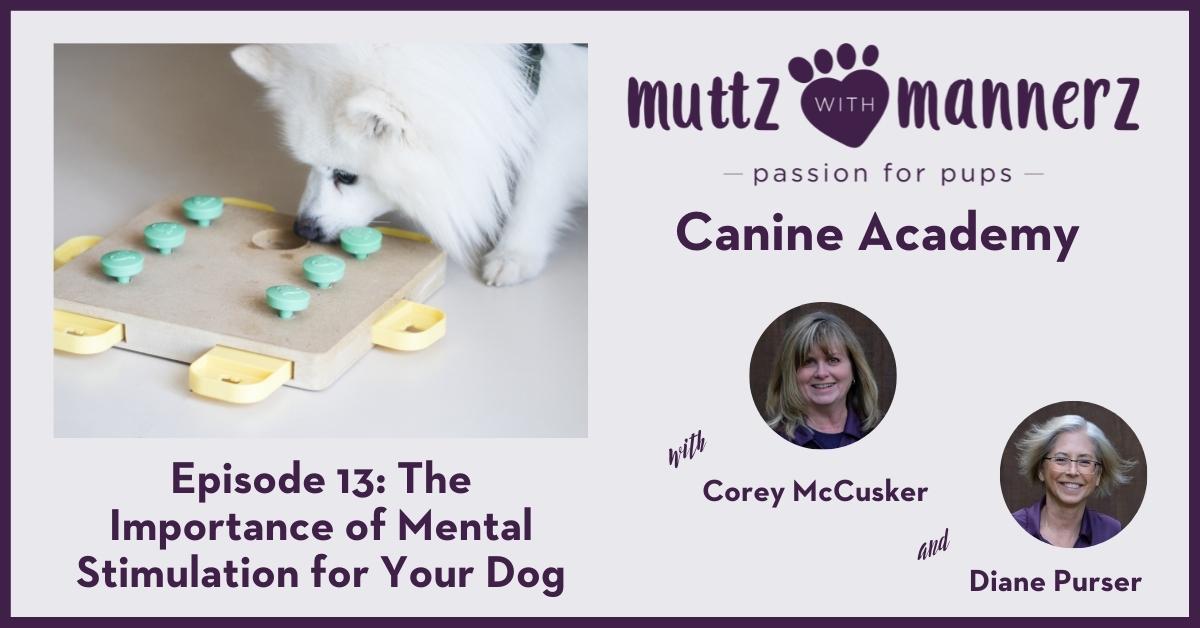
Corey McCusker 00:03
Hello dog lovers, and welcome to Muttz with Mannerz™ Canine Academy Podcast, where we’ll share dog training tips and educational information to help you raise your pup, young or old, so they can be a loving part of your family and your community for life. I’m your host, Corey McCusker, Canine Coach, and with me is Diane Purser, Educational Manager. Let me tell you a bit about our podcast. Today, we will talk about a topic that is not usually thought about – mentally exercising your dog. Owners spend many hours walking their dog or playing fetch with them to physically exercise them. This is great. But how often is your dog still active, or bored, and demanding attention from you? Diane, and I will discuss some points and provide some tips and resources on how you can add to their physical exercise.
Diane Purser 00:55
You know, Corey, I can relate to this with some of my past dogs. But more importantly, this issue really takes me back to days at the shelter. How often did we see dogs being surrendered for really no other reason other than they had too much energy, they were looking for attention constantly, or being physically destructive in the house. You know, generally dog owners know how to physically tire their dog. But what about being mentally tired? They need this mental exercise also. If those owners only knew some of the tips that we’ll be talking about today, those dogs could still potentially be with them. And for you listening, maybe you’re experiencing this to some degree – it’s happening in your home right now. So let’s talk about what mental exercise means. You know, basically, it’s just stimulating your dog’s brain. And it’s not necessarily a difficult thing to do, getting them used to using their brain and alleviate or lessen the built up energy and tire them out.
Corey McCusker 02:06
And, Diane, you’re so right. I mean, I get calls, looking for help with their dogs, because their dogs are chewing, barking, anxious, and they just won’t settle. Or maybe they’re counter surfing or when that doorbell rings or opens, they’re rushing to the door or they’re jumping on people. I just came from doing a private session and it was a comment I hear often after classes, or training sessions, where they say my dog is so tired after you leave – and we’ve only done some mental work. We haven’t done any physical. And a lot of these undesirable behaviours are because the dogs are bored, or they have this pent up energy. They have been allowed to do whatever behaviour they’re doing, as the owners may not know what to do with them, or their time is so limited. Boredom and energized dogs can be dealt with by a variety of activities that will have them using their brain.
Diane Purser 02:09
You know, it’s not just one thing that you could do to stimulate their brain, there’s actually a variety of things. And some of them are actually pretty simple. Like when you’re out on a walk, letting your dogs sniff, that engages their brain and to some degree also tires them out. But of course, as you know, training and sports activities are very important, but you can also do games. They can be set up around the house or around your backyard. Corey, can you provide some of the tools and tips that you use with your clients now or that you recommend to people to try on their own?
Corey McCusker 03:4
Sure, and there’s just so many. And I mentioned about the limited time some people have with their busy schedule. So I aim to make training and teaching easy, and that it fits into the people’s busy schedule and lifestyles. And you mentioned also breeds in age – I’m also taking that into consideration as some may need more mental stimulation, and some may need less. The two things I know people do our walk their dog and feed their dog. These are great times to engage their brain. Let’s talk about when you feed your dog. That food bowl that you put down, make them wait before they eat it. If they’re fast eaters, go purchase a slow feeding bowl and make them also work for that food or figure out how to eat the food and it actually slows them down. Obedience is a great way to add to the physical activities. So if you’re going on a walk or playing fetch, what you can do on your walk is make them think. As you’re walking, if you’re going to cross the street, make them sit and wait and then release them to go. Or if you’re walking, maybe stop the odd time and get them to sit and look at you. Those are great ways to get them focused. When you play fetch, teach them to stay, then throw that ball and then release them to go get it. Again, they’re draining their brain, they have to think about how do they stay when they want to go get that ball. You mentioned sniffing and exploring on walks. We offer scenting classes, and what the scenting classes does is, it teaches them to discover a scent which is hidden. You can easily do this outdoors in your backyard, or on a walk. While they’re on leash, you can throw some treats on the grass, and then go have them find it. Or if they’re one of those dogs that loves playing fetch, go hide the ball and have them find it. There are also many brain games, games that engage the brain that can be done in the house, which is great if you’ve got a rainy day and you want to tire your dog out. There’s puzzle games, where you combine many of these where the dog has to figure out what they need to do to move either with their nose or their paw to get to that reward, which is usually a treat. The “find it” command is a great one to teach them. And even taking three plastic cups or bowls, hiding a treat under it, and then moving those bowls or cups around and then have them go find where the treat is – which cup or bowl it’s under. Also, I know I teach this to a lot of kids, hide and seek, a great game that kids even like to play with other kids. Why not play it with your dog, and then get them to sit and stay, go hide yourself and then get your dog to find you. Tricks are another great way to engage their brain. Many of you teach tricks like bow, spin, or rollover. All of these are great. And these tricks provide your dog with a different form of stimulation. A fun sport we do is agility. And in the Fun with Agility, what we do is teach the dogs to maneuver obstacles like jumps, or going through tunnels and weave poles. And if you don’t have any agility jumps or poles at your home, don’t worry, you can make your own. And you can just use some stuff around your house, grab a blanket and throw it down, get them to go and stay on the blanket. They can jump over a broomstick, or they can weave through chairs. The benefit of putting a little obstacle course together is that it challenges them in a different way. You’re not just asking them to do one thing, you’re asking them to do one thing after another. Making your own obstacle course at home is a simple way to teach your dogs new tricks, and again, use their brain. The activities and brain games we mentioned are great examples of how to use some of their natural problem solving abilities. And by keeping your dog’s brain active and engaged with all of these various activities, you can help boost their focus, add meaning to their day, and alleviate problem behaviours.
Diane Purser 07:59
Well, you know, Corey, just like the old cliché, a happy dog is a tired dog. And for most dogs, that means physically and mentally tired. You’ve gone through some of the basics, but we are also providing you with some links to similar activities that just have a different take from others point of view. And thank you, everyone for joining us today to discuss the importance of mental stimulation for your dog. Before your dog starts to figure out their own way to beat their boredom, pick out some of these ideas and add them to your daily routine.
Corey McCusker 08:33
All right, thanks, Diane. And if you would like to learn more, for those of you listening, and try out some of our fun classes or obedient classes, or if you want to listen to our other podcasts, please visit our website at, www.muttzwithmannerz.com. If you have a question, or a topic you’d like to hear about on a future podcast, please email us at info@muttzwithmannerz.com. Thank you everyone for joining us. Have a great day and bye for now.
Diane Purser 09:03
Bye everyone.

